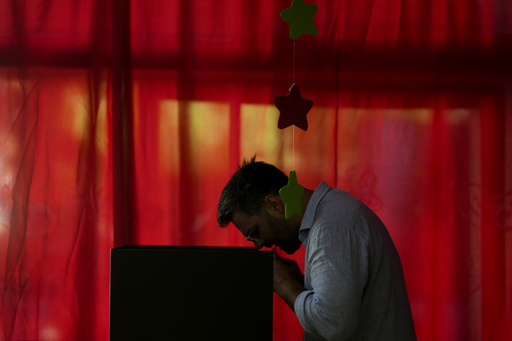
MONTEVIDEO, Uruguay — In a closely contested runoff election held on Sunday, Uruguay’s leftist opposition candidate, Yamandú Orsi, emerged victorious, succeeding in unseating the conservative governing coalition. This election adds Uruguay to a growing list of countries this year where voters have opted for change, rejecting incumbent parties in significant elections across the globe.
As the results were still being tallied, Álvaro Delgado, the candidate for the center-right ruling coalition, acknowledged his loss, standing alongside visibly disappointed family members and associates. “The nation of liberty, equality, and fraternity has triumphed once more,” Orsi declared to jubilant crowds waving flags and celebrating. He expressed his commitment to foster national dialogue and strive toward creating a more unified society.
As initial exit polling indicated a lead for Orsi, 57, a former history teacher and two-time mayor from Uruguay’s Broad Front coalition, cheers erupted along Montevideo’s beaches. Delgado, addressing supporters at his party headquarters in Montevideo, confirmed his defeat, urging his doubters to remain steadfast. “With sadness, but without guilt, we can congratulate the winner,” he asserted, though he emphasized that succumbing in an election does not equate to being defeated, eliciting applause from the crowd.
Drawing upon a legacy of former President José “Pepe” Mujica, who is renowned for positioning Uruguay among the most progressive and environmentally friendly nations in Latin America, Orsi campaigned on a message of safe change and a revival of his party’s previous social policies. With a close electoral outcome in mind, he reached out to those who opposed him, emphasizing the need for collective efforts towards a better future for all Uruguayans.
With nearly complete voter counts revealing Orsi secured 49.8% against Delgado’s 45.9%, the results highlighted a significant shift amid a backdrop of tightly contested races, where both candidates had been neck and neck in polls leading up to the election. The voter turnout, nearing 90% in a nation of 2.7 million eligible voters, included those who chose blank ballots or abstained entirely in protest of the mandatory voting law.
Political analysts noted that the relatively subdued campaigns from both candidates did not captivate uninterested younger voters and resulted in higher levels of indecisiveness among the electorate. However, the amicable tone of the campaigning illustrated Uruguay’s commitment to a stable democratic process, distinct from the anti-establishment sentiments that have characterized elections in regions like the United States and neighboring Argentina.
Orsi’s election heralds the return of the Broad Front, which held power for 15 years before the center-right government of Luis Lacalle Pou took over in 2019. Lacalle Pou publicly congratulated Orsi via social media, expressing his readiness to facilitate a smooth transition.
The surprising outcome mirrors a wider trend of discontent with post-pandemic economies, where voters across various nations have shown inclination towards anti-incumbent candidates. This electoral pattern has been evident in numerous elections throughout 2024, where voters dissatisfied with current governance have penalized sitting parties in countries from the U.S. to South Korea.
In contrast to the more radical shifts viewed globally, Orsi is seen as a moderate lacking intentions for dramatic reforms. He shares common ground with Delgado on key issues, such as reducing a troubling childhood poverty rate currently at 25%, and addressing the rise in organized crime that has unsettled a nation once recognized for its safety in Latin America.
Orsi, while in favor of revising certain trade agreements initiated under the previous government with China, promises a balanced approach akin to the successful strategies of President Mujica and former Broad Front leaders, focused on both market-friendly policies and welfare initiatives.
Under the Broad Front from 2005 to 2020, Uruguay experienced robust economic growth and pioneering social reforms acknowledged globally, from legalizing abortion and same-sex marriage to pioneering marijuana sales. Mujica, now 89 and recuperating from health challenges, voiced his pride on election day, commending Orsi’s dedication and the nation’s robust civic engagement.
Having spent a decade as the mayor of Canelones, a diverse town known for its beaches and agriculture, Orsi’s agenda includes incentives for investment and revitalizing agriculture. He endorses modifications to security frameworks and intends to address retirement policies, although he will not pursue the radical system overhaul that unions favored prior to the elections.
In the initial round of voting, where no candidate achieved a definitive majority, the electorate demonstrated fiscal restraint by rejecting proposals that would have allocated significant payments or redistributed pension funds. Supporters like Yeny Varone, a nurse, expressed optimism in Orsi’s vision, believing it would improve future conditions for succeeding generations.
Delgado, a 55-year-old veterinarian with a seasoned career in the National Party and recent Secretarial position under Lacalle Pou, ran his campaign with the mantra to “re-elect a good government.” With anticipated economic growth and declining inflation, he assured voters continuity in his predecessor’s pro-business strategies, having enjoyed a 50% approval rating.
The final results reflect a growing sentiment among Uruguayans frustrated by the government’s failure to reverse a lingering period of economic stagnation and rising crime rates. Additionally, some attributed Delgado’s defeat to ineffective communication strategies and a campaign approach that felt more negative than inspiring.
Analyzing the situation, Nicolás Saldías of the Economist Intelligence Unit noted Delgado’s struggle to connect with voters through his criticism of the Broad Front, calling it a “fear-based campaign” that ultimately fell short.
As Orsi prepares for the responsibilities of leadership, he expressed mixed emotions about his victory, acknowledging the considerable challenges ahead. “From tomorrow, I have to work really hard,” he remarked amidst a celebration of friends and allies, indicating that his administration will officially commence on March 1, 2025.
